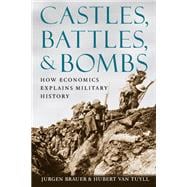
Note: Supplemental materials are not guaranteed with Rental or Used book purchases.
Purchase Benefits
What is included with this book?
Jurgen Brauer is professor of economics in the James M. Hull College of Business at Augusta State University and the author of Arms Trade and Economic Development. Hubert P. van Tuyll is professor of history and chair of the Department of History, Anthropology, and Philosophy at Augusta State University. He is the author of The Netherlands and World War I.
| List of Figures and Tables | p. xi |
| Preface | p. xiii |
| Economics | p. 1 |
| Economics | p. 6 |
| Opportunity Cost | p. 11 |
| Expected Marginal Costs and Benefits | p. 15 |
| Substitution | p. 20 |
| Diminishing Marginal Returns | p. 24 |
| Asymmetric Information and Hidden Characteristics | p. 27 |
| Hidden Actions and Incentive Alignments | p. 33 |
| Conclusion: Econimics-and Military History | p. 39 |
| The High Middle Ages, 1000-1300: The Case of the Medieval Castle and the Opportunity Cost of Warfare | p. 45 |
| Opportunity Cost and Warfare | p. 49 |
| The Ubiquity of Castles | p. 51 |
| The Cost of Castling | p. 53 |
| The Advantages of Castles | p. 59 |
| The Cost of Armies | p. 66 |
| Castle Building and the Other Principles of Economics | p. 72 |
| Conclusion | p. 76 |
| The Renaissance, 1300-1600: The Case of the Condottieri and the Military Labor Market | p. 80 |
| The Principal-Agent Problem | p. 83 |
| Demand, Supply, and Recruitment | p. 85 |
| Contracts and Pay | p. 89 |
| Control and Contract Evolution | p. 100 |
| The Development of Permanent Armies | p. 104 |
| Condottieri and the Other Principles of Economics | p. 114 |
| Conclusion | p. 117 |
| The Age of Battle, 1618-1815: The Case of Costs, Benefits, and the Decision to Offer Battle | p. 119 |
| Expected Marginal Costs and Benefits of Battle | p. 122 |
| The 1600s: Gustavus Adolphus and Raimondo de Montecuccoli | p. 127 |
| The 1700s: Marlborough, de Saxe, and Frederick the Great | p. 137 |
| Napoleonic Warfare | p. 147 |
| The Age of Battle and the Other Principles of Economics | p. 154 |
| Conclusion | p. 157 |
| The Age of Revolution, 1789-1914: The Case of the American Civil War and the Economics of Information Asymmetry | p. 159 |
| Information and Warfare | p. 163 |
| North, South, and the Search for Information | p. 165 |
| Major Eastern Campaigns through Gettysburg | p. 168 |
| Grant in Virginia | p. 181 |
| The American Civil War and the Other Principles of Economics | p. 190 |
| Conclusion | p. 194 |
| The Age of the World Wars, 1914-1945: The Case of Diminishing Marginal Returns to the Strategic Bombing of Germany in World War II | p. 197 |
| A Strategic Bombing Production Function | p. 201 |
| Bombing German War Production | p. 207 |
| Bombing the Supply Chain and the Civilian Economy | p. 213 |
| Bombing German Morale | p. 219 |
| Assessing the Effect of Strategic Bombing | p. 224 |
| Strategic Bombing and the Other Principles of Economics | p. 227 |
| Conclusion | p. 235 |
| The Age of the Cold War, 1945-1991: The Case of Capital-Labor Substitution and France's Force de Frappe | p. 244 |
| History of the Force de Frappe | p. 248 |
| The Force Post-De Gaulle | p. 257 |
| Justifying the Force | p. 260 |
| The Force's Effect on France's Conventional Arms | p. 267 |
| Substituting Nuclear for Conventional Forces | p. 272 |
| The Force de Frappe and the Other Principles of Economics | p. 282 |
| Conclusion | p. 285 |
| Economics and Military History in the Twenty-first Century | p. 287 |
| Economics of Terrorism | p. 289 |
| Economics of Military Manpower | p. 298 |
| Economics of Private Military Companies | p. 307 |
| Economics, Historiography, and Military History | p. 319 |
| Conclusion | p. 322 |
| Notes | p. 329 |
| References | p. 367 |
| Index | p. 387 |
| Table of Contents provided by Ingram. All Rights Reserved. |
The New copy of this book will include any supplemental materials advertised. Please check the title of the book to determine if it should include any access cards, study guides, lab manuals, CDs, etc.
The Used, Rental and eBook copies of this book are not guaranteed to include any supplemental materials. Typically, only the book itself is included. This is true even if the title states it includes any access cards, study guides, lab manuals, CDs, etc.